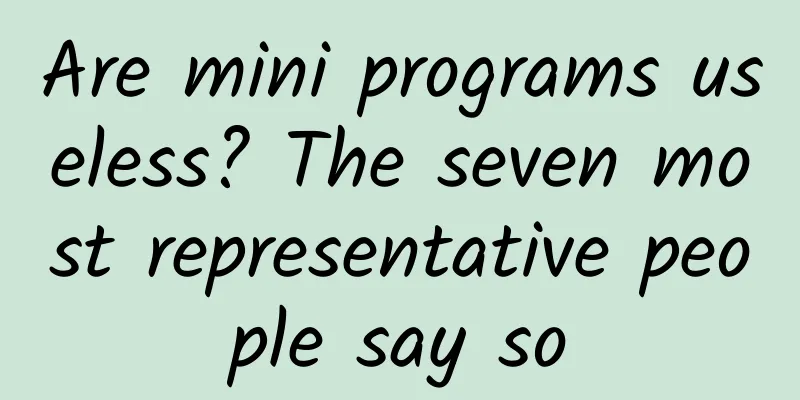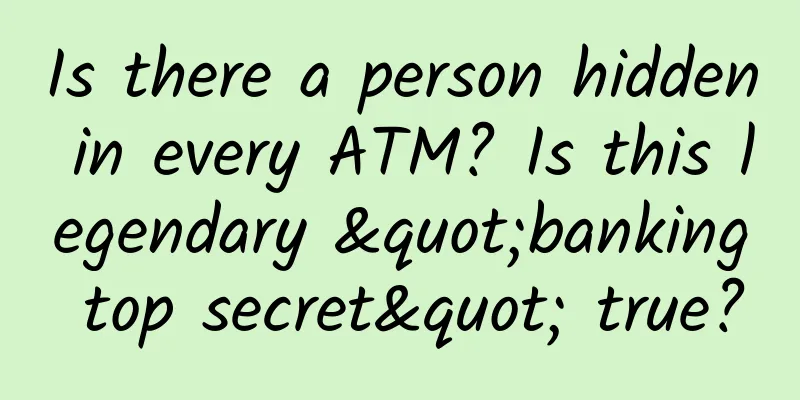Are mini programs useless? The seven most representative people say so

|
On December 28, Zhang Xiaolong further elaborated on Mini Programs in the WeChat Open Class PRO version. After that, some existing speculations were verified, and some were broken. So what exactly is Mini Program? What kind of team is it most useful for? What is its value? Many people think it is useless, while others think it can help more entrepreneurs. What do you think? Based on the current public information, we invited the people who can answer these questions most effectively to talk to us. Among them, there are colleagues from Jingwei, Xiao Min, Wang Huadong, and Qian Kun, who will provide some analysis from the perspective of the general trend; we also invited Bai Ya from Youzan, who should be the entrepreneur who is closest to WeChat Mini Programs and the person who understands this matter the most, to ask what he thinks; and Lai Yilong, founder and CEO of Lizhi FM, how he feels as one of the first users of the Mini Program internal test; and Zhang Wei, the founder of Xinshixiang, who started from WeChat, how he views the Mini Program; finally, we also talked to our good friend Feng Dahui, who submitted his answer sheet before the deadline of the "Mini Program Essay Competition". I hope these "opinions from all sides" can help you better sort out your views on mini programs at this stage and make decisions. 01 How to view mini programs? Jingwei Xiao Min: Mini programs are a new form of mobile applications. The original intention of the WeChat team is still to start from the interests of users and make it more convenient for users to use services. Therefore, no installation, no registration, no uninstallation, and no disturbance are the value points that WeChat specifically emphasized when designing. Although the mini program has not been launched yet and is still imperfect, this program development idea is undoubtedly correct. It is correct in two aspects: first, it takes care of the interests of users to the greatest extent; second, this application usage form is future-oriented, and the principles proposed today will not be outdated ten years later. Zhang Xiaolong spent a lot of time in his speech explaining why programs should be free of installation, registration, and uninstallation. Free installation, registration, and uninstallation are in line with human nature and are the most natural way for users to use services. At the same time, Zhang Xiaolong also envisioned what applications will look like in the future era of smart glasses: they should still be free of installation, registration, and uninstallation, and respond automatically at the right time. For users, WeChat is as important as air, food, and water. With the current prosperity of the WeChat ecosystem, the top-notch design and implementation capabilities of the WeChat product technology team, and the influence of WeChat products on users and developers, mini programs are likely to become a prosperous ecosystem. The lightweight applications promoted by other companies cannot be compared with mini programs. *Xiao Min is a partner at Matrix Partners China. His focus is on trading platforms 02 What is the current positioning of mini programs? Wang Huadong, Jingwei: Mini Programs do not have a separate entrance, but are a carrier. They may not be that helpful for many pure Internet products, but rather provide the function of "scan code to enter, use immediately, and leave immediately". Therefore, they are very useful for many O2O services, especially for offline layout, and providing scanning code services for offline merchants. Previously, when we scanned codes offline, we could only enter pages with simple functions. Now, we can enter pages with relatively rich functions, which brings more added value to both users and merchants. For entrepreneurs who want to spread through the WeChat social system, mini programs are not very helpful at present. This is because they only allow spreading in chat windows, which is relatively limited. However, the sharing permission of Moments is not open to mini programs at present, which is of limited help to entrepreneurs engaged in social media communication and social e-commerce. *Wang Huadong is a partner of Matrix Partners China. His areas of focus are new technologies, pan-entertainment, and community social networking. 03 For which entrepreneurs does the mini program help, and for which entrepreneurs does it become a hindrance? Jingwei Xiaomin: Mini programs are very suitable for lightweight service scenarios, such as ordering food and buying tickets, which Zhang Xiaolong mentioned in his speech. Small teams and lightweight products should actively use mini programs. Mini Programs do not allow sharing to Moments, and there are many restrictions on sharing, which makes them very unsuitable for content products (if they cannot be shared to Moments, users will definitely not use them), media products, and promotion products. Any application where sharing to Moments is an important use case for the product is not suitable for Mini Programs, unless WeChat allows apps to share pages to Moments using the WeChat open platform interface. For established companies that already have a large App user base, it would be more appropriate to get involved in Mini Programs now with a mindset of research and follow-up. After all, the infrastructure of Mini Programs is still very immature, and it will take some time for the rules and technical stability to become clear. Mini Programs were not originally designed to meet the needs of top Apps, and it is estimated that they will not invest time and energy in serving top Apps for a long time. It is a great opportunity for service-oriented O2O, but a great challenge for apps that provide light services. 04 What impact does it have on entrepreneurs who rely on social network communication or leverage? Youzan Baiya: It is true that WeChat official accounts have reduced the cost of starting a business for many people. However, official accounts are a chat environment after all, and it is still very problematic to implement many products in official accounts. Mini programs can meet these requirements very well. Mini programs will indeed make the threshold for product implementation very low for many entrepreneurs. Mobile Internet has greatly increased the cost of starting a business, and mini programs have greatly reduced this cost. *Bai Ya is the founder and CEO of Hangzhou Youzan Technology Co., Ltd. 05 Do you think mini programs will become a killer product? Jingwei Qiankun: Subversion is not WeChat's goal. WeChat has been doing things that are in line with its product positioning throughout its history. For example, WeChat's Moments are visible only to acquaintances, not everyone; they are based on first-degree social relationships, not second-degree social relationships - this shows that they know what they want to do: they only serve the relationship in the address book. Mini Programs are a "killer" thing, which encourages infrequent App developers and users to switch to Mini Programs. Mini Programs can solve problems that WeChat's current subscription accounts and service accounts cannot solve, and I am quite optimistic about them. But the purpose of making mini programs is not to become a killer app, because WeChat is already one. The benefit of mini programs is that they can solve many of the needs of companies that do not have such a high frequency, such as team and download. Entrepreneurs originally had no entry point to develop apps and needed to promote them. From this point of view, WeChat does not increase costs. And because of the convenience of mini programs, it has lowered the development threshold for some entrepreneurs. On the one hand, mini programs have lowered the threshold for developing applications; on the other hand, the relationship between mini programs and the WeChat ecosystem is not that close, so entrepreneurs in this area do not need to consider the traffic dividends of this kind of gameplay in the short term. But in the future, there will definitely be some gameplay. Even if it does not provide traffic dividends, the mini program does make it easier for user traffic to enter. The challenge may be that since the mini program lowers the threshold, in other words, it intensifies competition. * Qian Kun is the investment director of Matrix Partners China. His areas of focus are Internet finance, consumption upgrade, and education. 06 What impact will mini programs have on apps? Youzan Bai Ya: Many people say that mini programs are light applications and will snatch profits from the AppStore (it seems even Apple is so foolishly alert). Others say that mini programs turn WeChat into an operating system. Obviously, these views are too static and limited. If we look back at it from a decentralized perspective, we will find that mini programs are solving the problems that apps want to solve, but consumers do not buy into because of the high cost of using them. These long tail problems make up the small problems in our lives. Because of these small problems, we should not and are not willing to install a special app to solve them. To say that WeChat is an operating system is obviously very narrow-minded. "WeChat is a lifestyle," WeChat itself said. So, WeChat is actually life. To put it more concretely, WeChat is this society. There are friendships, information shared between friends, a virtual society. As the Internet penetrates deeper into life, people are migrating, the real world is becoming quieter, and the virtual society is becoming more and more noisy. WeChat is indeed becoming more and more important. The WeChat society is noisy not only because more and more friends are not real friends, but also because there is no real connection with life in the WeChat society. There is still a wall between the real world and the virtual society, which makes both societies uncomfortable. Mini programs are used to break down that wall. In the PC Internet era, we used Baidu to find the official website of a service organization or enterprise, and thus crossed that wall to try to get closer to the real world. In the wireless Internet era, these things failed, so public accounts appeared. However, using a message chat window to solve this problem is obviously not enough, so there is a small program. What it will achieve is the integration of the real world and the virtual society. Mini Programs are not about turning WeChat into an operating system, but into a real society. What is in society will definitely be available here. 07 How do you feel as one of the first testers of the mini program? What role do you think the mini program plays in your existing business? Lai Yilong from Lizhi FM: Mini Programs are a very pioneering attempt, and we are very willing to participate in such an attempt. Such an attempt may not necessarily succeed, but it is very meaningful and worthwhile. Whether the Mini Program is easy to use is not the issue to be discussed now. We need to see the user's reaction, and the user's judgment is the most important. Lizhi FM is one of the few companies in the first internal test that developed the mini program into a pan-entertainment and social platform. The WeChat mini program is lightweight and very suitable for the listening habits of Lizhi FM users. It can be used to listen to content and share quickly anytime and anywhere in fragmented life. For us, mini programs are a brand-new way of service. There is no need for installation or subscription. We look forward to users' reactions to this service experience and whether it is easier and faster for them. * Lai Yilong is the founder and CEO of Lizhi FM 08 What kind of company is suitable for developing mini programs? Jingwei Qiankun: To do this well, we still need to have a high-frequency thing and a feasible scenario to support it. It is difficult to support it if there is only traffic but no interaction or social attributes. It is more natural for WeChat to do this because many users have realized that the functions of service accounts and subscription accounts are not perfect. For example, Zhihuitu (an indoor positioning and navigation solution provider) invested by Jingwei can combine a mechanism to do their business better. 09 "New World" started from WeChat and has not yet developed an app. As an entrepreneur of this type, what do you think of mini programs? Zhang Wei of New World: We have attached great importance to and looked forward to the mini program since the first day we heard the news. But judging from the release yesterday, it is still different from what we imagined, and we are still digesting it. It is not quite like the "App in WeChat" as everyone understands it, or at least it is not a substitute for the App in its current form. Xinshixiang has already completed three mini programs, namely social, content, and tools. However, we will not release all of them at once, because the final entrance presentation form, dissemination path, and secondary return visit method of the mini program have not been fully revealed, and these aspects will affect the dissemination of a mini program and the value it can ultimately generate. I think human creativity is definitely very strong, and there will be people who can make great use of mini programs, and we are looking forward to it. *Zhang Wei is the founder of New World 10 Do you think mini programs are useless? Wuma Technology/ Rumor Feng Dahui: The WeChat team has invested a lot of energy and thought into mini programs in the past year. Many people in the industry may underestimate the potential of mini programs (overestimating or underestimating mini programs is probably problematic now). Drawing conclusions about something in advance is as simple as flipping a coin. The right thing to do is to find a few mini programs to experience and try them out. Official accounts differentiate between subscription accounts and service accounts, but service accounts left too many problems. Looking back now, it can be said that this was a mistake, but this mistake inspired the emergence of mini programs (application accounts). Things that service accounts cannot accomplish may be completed by mini programs. From this point of view, the imagination of mini programs is at least greater than that of service accounts, which is the fundamentals. Another layer of value of mini programs is to activate and open up more application scenarios, whether online or offline. There is a new product to try out. I think some technical and product people will be excited about this, while others will not. This is basically the case before the change comes. Some people say that mini programs have no future because there is no traffic stimulation. What I have seen is that new things that have traffic stimulation basically die out quickly. If a product is not stimulated by user demand, no matter how much traffic is poured into it, there will be problems. Another disadvantage of traffic stimulation is that it will attract too many players who take advantage of loopholes. These people who are looking for traffic dividends everywhere are not good for any platform. I would like to advise everyone not to think about traffic dividends anymore. With the development of the Internet, I am afraid that no one can catch the so-called dividends. If there are any, it will not be you. Roll up your sleeves and do it. I saw some people from Baidu lamenting about "Direct Number". With all due respect, Baidu's creation of Direct Number may have been a good idea, but Baidu did not have an account system and could not do a good job of providing backend tools for developers, so it was normal that this product did not make much of a splash. There is no need to lament, the original intention of Direct Number was not that big. WeChat will not allocate traffic to mini programs, nor will there be any so-called traffic dividends. I certainly cannot understand this. After all, it is too difficult for any product to achieve such a scale and not use traffic to stimulate a new product. But the WeChat team did it. Some people say that the WeChat team was restrained, but I think they were humble enough. It may also be because they have done many things that others cannot do, so they are humble. As a winner of Toutiao's Qingyun Plan and Baijiahao's Bai+ Plan, the 2019 Baidu Digital Author of the Year, the Baijiahao's Most Popular Author in the Technology Field, the 2019 Sogou Technology and Culture Author, and the 2021 Baijiahao Quarterly Influential Creator, he has won many awards, including the 2013 Sohu Best Industry Media Person, the 2015 China New Media Entrepreneurship Competition Beijing Third Place, the 2015 Guangmang Experience Award, the 2015 China New Media Entrepreneurship Competition Finals Third Place, and the 2018 Baidu Dynamic Annual Powerful Celebrity. |
<<: Uber to develop self-driving cars with Daimler
>>: Daimler plans to invest 10 billion euros in electric vehicles and launch more than 10 models
Recommend
Why are olefins important? You may not have heard of this term, but it fills your life
Produced by: Science Popularization China Author:...
How to write soft advertising to convince your users?
As a self-media , one of the ways to monetize is ...
The 2023 Turing Award is out! Why is the "randomness" of computers so important?
Last night, the Association for Computing Machine...
How to use Zhihu ranking to accurately attract traffic and realize monetization from 0 to 1?
Before talking about the ranking principles of Zh...
"Get started first" and you have eliminated more than 50% of your competitors
A famous domestic novelist came to the school to ...
Selling controlling stake in gaming and entertainment for RMB 3.3 billion Will smart cars become NetQin's main line?
When it comes to Internet security software, we h...
Can't buy vitamin C? Don't panic, these foods are very good for vitamin C!
With the relaxation of new epidemic prevention po...
How to plan creative materials for high-conversion information flow ads? Avoid these 4 mistakes!
Before talking about what is good information flo...
ELISA《YouTube Operation and Promotion Practical Skills》How to play YOUTUBE in the eyes of foreigners
Training course content: How to use YouTube in th...
How much does it cost to customize the Xianyang Big Roulette Mini Program? What is the price quote for the customized Xianyang Big Turntable Mini Program?
How much does it cost to customize the Xianyang B...
Research shows more than two dozen popular iOS apps send user data to third parties
Recently, a new study claims that more than two d...
Google releases Chrome 92 software update for iOS and Android mobile platforms
This week, Google released a new version of the G...
How much does it cost to develop the Honghe pregnancy and childbirth mini program? What is the quote for developing the Honghe pregnancy and childbirth mini program?
According to industry insiders, mini programs wil...
.NET is open source, Visual Studio starts to support Android and iOS programming and comes with an Android emulator
At the Connect() conference held early this morni...
There are fake public WiFi connections, will you regret it? Don’t ignore network security during the Spring Festival!
Network security risks during the Spring Festival...





![[Practical Tips] Frontline marketing personnel have contributed all their ASO knowledge!](/upload/images/67cc40bf827ed.webp)



